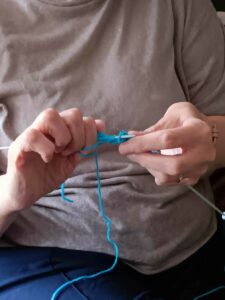 One of my relatives is a knitter. I don’t mean now and again, but every time she sits down. She takes her knitting with her everywhere, except to the supermarket and cinema. Significantly, she rarely gets stressed. She says she is not a worrier, and I think it’s because there’s a correlation between the knitting and her mood. The rhythm, the texture of the wool and the growing garment are satisfying and calming.
One of my relatives is a knitter. I don’t mean now and again, but every time she sits down. She takes her knitting with her everywhere, except to the supermarket and cinema. Significantly, she rarely gets stressed. She says she is not a worrier, and I think it’s because there’s a correlation between the knitting and her mood. The rhythm, the texture of the wool and the growing garment are satisfying and calming.
There are currently 1.3 million people off work with anxiety, stress, or depression. Stress is our body’s response to psychological pressure. We all deal with stress differently – things that stress one person won’t raise an eyebrow in another.
We need a certain level of stress at times in order to deal with life, but when it becomes chronic the damage begins. Chronic stress leads to inflammation that’s the root cause of many diseases. For example, chronic stress in mid-life doubles the risk of dementia in later life.
When under stress our bodies release a surge of hormones. These hormones cause the heart to beat faster and the blood vessels to narrow, and increase blood pressure for a time.
In the ‘Times’ recently there was an article describing twenty-seven ways of de-stressing. A poll among 2000 adults found that among the methods people found most effective was having a cup of tea. Tea contains an amino acid that is relaxing, and there’s something culturally soothing about a cup of tea. (An Iranian friend once told me that he knew the local hospital was declining because they couldn’t make a decent cup of tea anymore.) In the ‘Times’ list of seventy-two there was also my favourite – curling up with a good book, which can lower your heart rate in six minutes. I didn’t think much of the advice to put ice packs on your face or neck. Apparently, it slows your heart rate, though it would probably stop mine altogether.
Christians are not immune to stress. Jesus knew that, and said, ‘Come unto me, all ye that labour and are heavy laden, and I will give you rest. Take my yoke upon you, and learn of me; for I am meek and lowly in heart: and you shall find rest unto your souls.’ (Matthew 11: 28-30)
Commentaries describe His ‘burden’ as His commandments and teaching, and we are taught them and learn and absorb them all our lives. Being ‘yoked’ to Jesus is a reference to how a yoke, a wooden bar or frame, used to join draft animals at the heads or necks so that they pulled together, with the plough behind them. Being yoked to Jesus means He takes most of the strain as we plough through our lives.
Yet even though we are yoked to Jesus it sometimes seems impossible to hand over our stressful circumstances to Him. We pray about it, but keep turning over in our minds. Pastor Joel Osteen told the story of the huge amount of money the church needed to raise at one time, and how the Lord said to him that He wasn’t free to handle it until Joel fully let it go. (He did, and the money came in.)
The good thing is that the more we hand over to Jesus and PROVE Him in this, the more able we are to hand everything to Him, quickly. We’ll be discussing this in the September Zoom, and I’m looking forward to learning from participants, as well as sharing. Are you good at handing worries over to Christ? Put September 12th, at 2:30 in your calendar! It’s the date of our next meeting via Zoom where, in a cognitive behavioural context we will be sharing understanding and tactics that help deal with both anxiety and depression.














